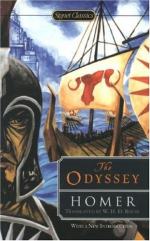The few foot-notes in this book are chiefly intended to make clear some passages where there is a choice of reading. The notes at the end, which we would like to have written in the form of essays, and in company with more complete philological and archaeological studies, are chiefly meant to elucidate the life of Homer’s men. We have received much help from many friends, and especially from Mr. R. W. Raper, Fellow of Trinity College, Oxford and Mr. Gerald Balfour, Fellow of Trinity College, Cambridge, who has aided us with many suggestions while the book was passing through the press.
In the interpretation of B. i.411, ii.191, v.90, and 471, we have departed from the received view, and followed Mr. Raper, who, however, has not been able to read through the proof-sheets further than Book xii.
We have adopted La Roche’s text (Homeri Odyssea, J. La Roche, Leipzig, 1867), except in a few cases where we mention our reading in a foot-note.
The Arguments prefixed to the Books are taken, with very slight alterations, from Hobbes’ Translation of the Odyssey.
It is hoped that the Introduction added to the second edition may illustrate the growth of those national legends on which Homer worked, and may elucidate the plot of the Odyssey.
PREFACE TO THE THIRD EDITION.
Wet owe our thanks to the Rev. E. Warre, of Eton College, for certain corrections on nautical points. In particular, he has convinced us that the raft of Odysseus in B. v. is a raft strictly so called, and that it is not, under the poet’s description, elaborated into a ship, as has been commonly supposed. The translation of the passage (B. v.246-261) is accordingly altered.




